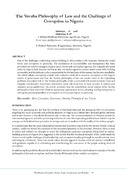| dc.contributor.author | Adebayo, A | |
| dc.contributor.author | Akintona, E.O | |
| dc.date.accessioned | 2020-01-13T08:33:29Z | |
| dc.date.available | 2020-01-13T08:33:29Z | |
| dc.date.issued | 2019 | |
| dc.identifier.citation | African Journal of Humanities and Social Sciences (AJHSS,), Volume 1 Issue 1, 2019 | en_US |
| dc.identifier.issn | ISSN:2307-2164 | |
| dc.identifier.uri | https://karuspace.karu.ac.ke/handle/20.500.12092/2370 | |
| dc.description.abstract | One of the challenges confronting nation-building in Africa today is the incessant, destructive social forces and corruption in particular. The mechanism of accountability and transparency has been perverted not only by managers of governance, but by anti-corruption agencies. For example, the penal codes in Nigeria have become inertial as anti-corruption agencies cannot match word with evolving criminality, and the judiciary who is supposed to be the last hope of the masses, has become unreliable. The article adopts conceptual, analytic and evaluative methods to examine corruption in the Nigeria system of government and how the Yoruba philosophy of law can resolve some of the impending problems associated with it. The Yoruba philosophy of law is enriched with moral rectitude (iwa) and integrity (omoluwabi); it provokes reformative mind sets from time to time in order to achieve and maintain social equilibrium. The article concludes that the embellished moral content of the Yoruba philosophy of law outwit the Western mainstream legal system; hence, adopting it will go a long way in solving the perennial problem of corruption in Africa and Nigeria in particular. | en_US |
| dc.language.iso | en | en_US |
| dc.publisher | AFRICAN JOURNAL OF HUMANITIES AND SOCIAL SCIENCES (AJHSS) | en_US |
| dc.subject | Africa, | en_US |
| dc.subject | Corruption, | en_US |
| dc.subject | Governance, | en_US |
| dc.subject | Morality, | en_US |
| dc.subject | Philosophy of law, | en_US |
| dc.subject | Yoruba | en_US |
| dc.title | The Yoruba Philosophy of Law and the Challenge of Corruption in Nigeria | en_US |
| dc.type | Article | en_US |
